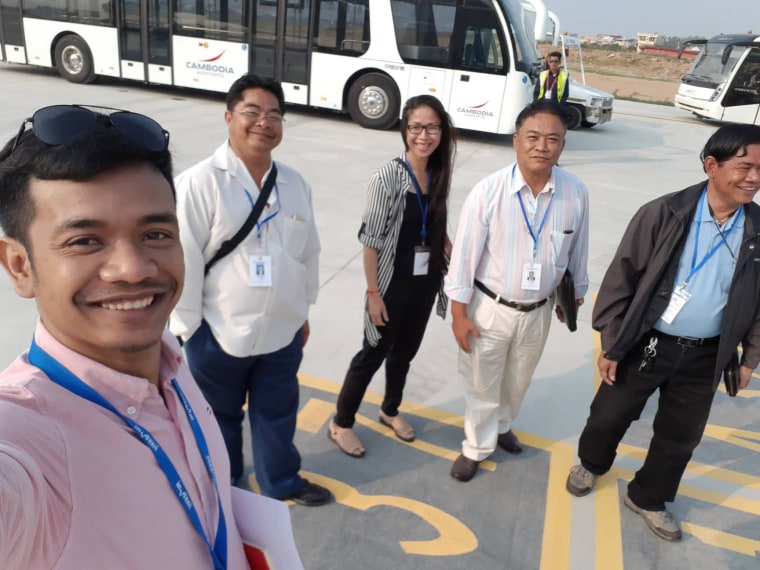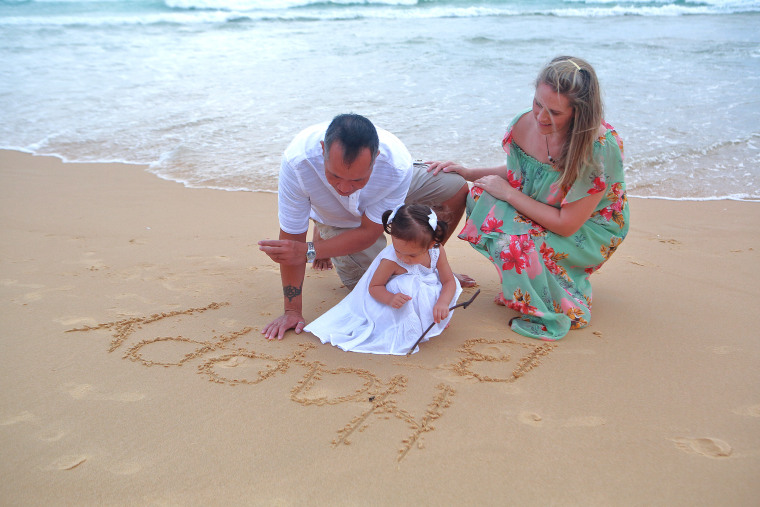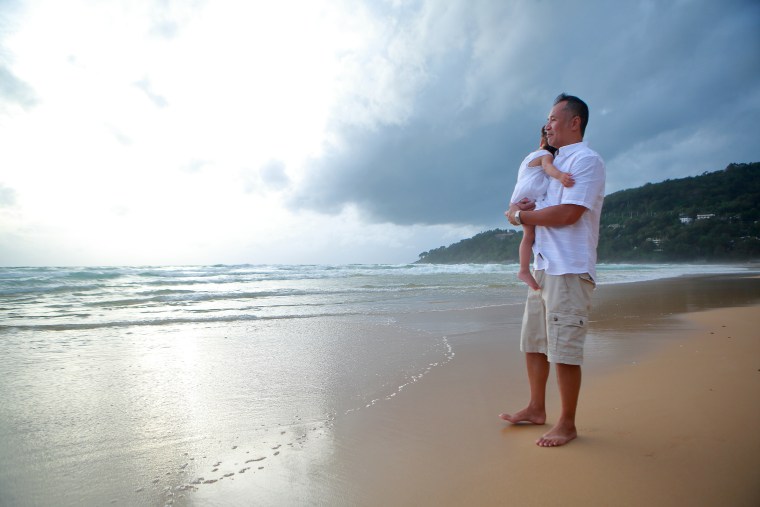Every day, Sothy Kum wakes up at 6:30 a.m. to talk to his wife and their 2-year-old daughter in Wisconsin, more than 8,000 miles away from his condo in Cambodia, where he's lived for the past nine months.
It's 5:30 p.m. then in the Midwest, and Kum's wife is typically just leaving work. They stay on the line for three to five hours until their daughter's bedtime.
Those conversations have become a lifeline for Kum, 44, since he was deported to Cambodia last April. Hearing the voices of his wife and daughter helps him cope with depression as he adjusts to life in a country he left when he was 2.
“I'm still not used to it,” he said. “I'm still scared of the traffic. I can't find any peace here.”
Kum is one of 126 people who were deported from the U.S. to Cambodia in 2018. According to Bill Herod, spokesman for the Khmer Vulnerability Aid Organization, it's a record for any single year since deportations to Cambodia began in 2002, when the two countries signed a repatriation agreement that opened the pathway for refugees to be sent back to Cambodia.
There are several possible reasons for the rise in deportations. One is that the U.S. has pressured Cambodia to take in the refugees who are being deported. In 2017, Cambodia had halted the deportations by refusing to receive the refugees, with the goal of negotiating a new agreement that would give deportees more freedoms, including allowing them to return to the U.S. to visit relatives. In retaliation, the Trump administration imposed limits on visas from Cambodia, among other countries that refuse to take deportees. Cambodia responded by allowing the deportations to resume last year, and a surge followed.
The number of deportees has also been driven by the Trump administration's crackdown on illegal immigration generally. In fiscal year 2018, tens of thousands more immigrants were arrested and deported by Immigration and Customs Enforcement's Enforcement and Removal Operations, which focuses on immigrants who have been living in the country, compared to fiscal year 2016, according to an ICE report.
Advocates expect the number of deportees returned to Cambodia to continue to rise.
Many of the recently deported Cambodian refugees had been in America for decades and were booted for committing minor crimes — in Kum's case, marijuana possession with intent to distribute, for which he served one-year sentence. Kum had arrived in the U.S. when he was about 5, after fleeing the Khmer Rouge with his family and spending time in Thailand and the Philippines.
“Culturally and socially, they are Americans," Herod said of the deportees. "Taking them away from their spouses, children and aging parents in the U.S. is harmful to American communities.”
Over the last 16 years, the Khmer Vulnerability Aid Organization has assisted 701 Cambodian deportees like Kum, most of whom have adapted to new lives in the southeast Asian country, Herod said. Many secure jobs as English teachers, while others work as security guards, tour guides, drivers and interpreters, he said. Several have established their own small businesses, including restaurants and transportation companies.
“Those who choose to blend into their new communities tend to adjust well over time. They marry and raise families, hold steady jobs, respect local traditions and interact easily with their neighbors,” Herod said.

But integrating into life in Cambodia can take years, and for many, it's far from an easy transition. The Khmer Vulnerability Aid Organization, which keeps in touch with returnees through visits and social media, has seen some resort to substance abuse or suicide, and dozens have been incarcerated, Herod said.
The 2018 returnees who spoke with NBC News said adjusting to life in Cambodia has been an uphill battle. For some, it's been difficult to get used to a country where there aren't always flushing toilets and where the smell of burning trash in their neighborhoods is constant.
Others are financially paralyzed, unable to secure jobs because they haven't yet been issued necessary identification documents. One man in that situation said he is depending on resources provided by the Khmer Vulnerability Aid Organization — including housing and food — as he doesn't want to burden his family by asking for money.
For Thy, 49, who arrived in August and asked to withhold his last name due to ongoing legal proceedings, coming back to Cambodia has been devastating and confusing. He said he had worked in a labor camp under the Khmer Rouge regime before fleeing with his family to the U.S. when he was about 10. In the U.S., he was receiving mental health treatment for post-traumatic stress disorder. But in Cambodia, he said he hasn't had access to the medication or the counseling he needs.
Sophea Phea, who was deported from the U.S. in 2011 after serving prison time for credit card fraud, previously told NBC News that she had turned to alcohol to cope with being isolated from her friends and family, including her son, who was 8 when she left the U.S.
“It was hard the first few years because I was away from family,” she told NBC News in April. “I was stressed out, trying to find myself and what I can do in Cambodia to live comfortably and integrate comfortably because the jobs here, the salary is very low. I drank a lot of alcohol just to cope with all the emotions, so I kind of just numbed myself by that.”
After Phea connected with others in her situation, they founded 1Love Cambodia, a branch of the 1Love Movement group that is advocating for an end to the deportations. As of last year, she also worked as a teacher in Phnom Penh.
Kum said he has been laughed at by locals for his basic proficiency in Khmer, was once almost extorted by police who could tell he came from the U.S. and is still afraid to walk around the city, where traffic is erratic and there aren't any sidewalks.
But the heaviest struggle, returnees agree, is being thousands of miles away from their families in the U.S.
“It’s depressing and it’s just killing me, why I’m here being useless while I could be helping my family so they don’t have to struggle,” Kum said.

As of last October, there were 1,856 Cambodian nationals in the U.S. with final orders of removal, which means they're slated for deportation. About 1,300 of them had criminal convictions, according to ICE spokesman Brendan Raedy.
Herod said the Khmer Vulnerability Aid Organization is expecting to welcome 200 new returnees this year, based on guidance from U.S. officials. To prepare for the surge, the organization has rented a new transitional housing facility that can accommodate 50 people. In the past, the group has typically welcomed fewer than 10 people at a time. Last year, it received its largest group of 43 returnees in April.
In the U.S., advocacy groups are continuing to protest the deportation of Cambodian nationals, many of whom arrived after fleeing war in Southeast Asia in the 1970s. Last month, dozens of organizations participated in events held across 15 cities to raise awareness about how mass incarceration in the U.S. has led to the deportation of Southeast Asian Americans.
“For me, this whole thing is very inhumane,” Borey “PJ” Ai, 37, a Cambodian national at risk of deportation, said.
When Ai was 14, he shot and killed a convenience store worker during a robbery — the shooting was an accident, according to his lawyers. He was prosecuted as an adult, convicted of second-degree murder and sentenced to 25 years to life in prison, the San Francisco Chronicle reported. While behind bars, he began organizing counseling programs and got a college degree. After his release, he became a state-certified drug and alcohol counselor.
If he were sent to Cambodia, Ai worries he wouldn't be able to blend in because he doesn't speak, read or write Khmer. He also wouldn't have family to turn to.
Ai applied for a pardon that was blocked last year by the California Supreme Court.
“I feel like ICE isn’t being fair," he said. "We’re all human beings. We matter."
Follow NBC Asian America on Facebook, Twitter, Instagram and Tumblr.



